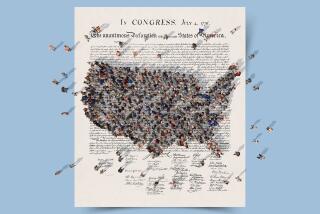From the Cradle
- Share via
Gordon S. Wood is an immensely distinguished historian whose masterpiece, “The Radicalism of the American Revolution,” won the Pulitzer Prize in 1993. Readers who know that book will recognize the Modern Library’s “The American Revolution” as a distillation of its arguments. Comparatively little has been lost, and some points emerge with greater force than before.
Wood’s “Revolution” is mainly about ideas--specifically, republican ideology, a strain of English radical thought that made close connections between property-holding, political liberty and individual rights. A threat to the security of property--say by taxation to which subjects had not consented--threatened liberty itself and had to be resisted at all costs. Republican beliefs mobilized colonists against Parliament’s efforts to levy modest taxes on them, but these beliefs also encouraged them to draw democratic inferences about rights, liberty and equality that frightened the conservative gentlemen who had first organized the resistance movement.
Wood shows, with verve and narrative economy, how the revolt against imperial power produced the world’s first written constitutions, amazing documents written during the War of Independence, when one might imagine that people had more pressing concerns than defining the relationship between legislative and executive powers. But the war itself, with its continual violence and threats of social disintegration, necessitated such statements of principle. The states were so weak that they could only hope that political order could arise from the voluntary allegiance of citizens whom they had no power to coerce but who might be reassured by promises that government power would be strictly circumscribed. No government had ever rested on such a fragile foundation. Revolutionary Americans tried it in part because they feared power and in part because they had no alternative.
Having taken care to create governments with limited coercive capacity, Americans had to deal with the consequences of freedom. The resulting social ferment--religious enthusiasm, economic individualism, the growth of antislavery and other reform movements--alarmed conservative revolutionaries, who concluded that their countrymen lacked the ability to rise above self-interest and serve the common good.
A main source of anxiety for such men was the behavior of the newly egalitarian legislators who ran state governments. Responding to their constituents’ demands rather than to the dictates of virtue, states vied with their neighbors as if they had never cooperated in the struggle for independence. With the war over, it seemed as if the United States would disintegrate in anticipation of the full realization of Americans’ potential for anarchy.
The result, of course, was that most surprising legacy of the Revolution, the federal Constitution, the fundamental compact of American nationhood that endures to this day. Wood tells this complex, ironic tale with clarity, grace and wit, and he does it in a very brief compass. His great achievement, however, is to communicate the unpredictability of processes by which an austere commitment to civic virtue ultimately gave rise to a bumptious egalitarian political culture and a radically individualistic economic system.
In that sense, this slim book tells a big story: one that invites the reader to contemplate the relationships between liberty, power, rights and the unpredictable outcomes of human action. Such reflections may well be more needful now, in the midst of a great revival of patriotic spirit, than at most times in the republic’s history.
*
Fred Anderson teaches American history at the University of Colorado at Boulder. His most recent book, “Crucible of War: The Seven Years’ War and the Fate of Empire in British North America, 1754-1766,” won the Francis Parkman Prize for 2001.
More to Read
Sign up for our Book Club newsletter
Get the latest news, events and more from the Los Angeles Times Book Club, and help us get L.A. reading and talking.
You may occasionally receive promotional content from the Los Angeles Times.










